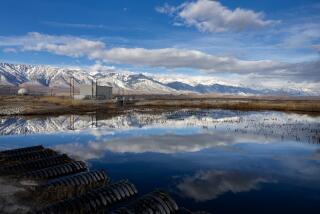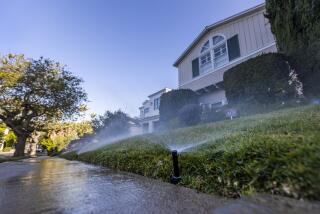Commentary : Stopping a Possible Water Crisis
- Share via
It is said that “you don’t miss your water until the well runs dry.” Nothing better typifies the attitude of most Orange County residents about the subject of water. As long as water comes out when we turn the tap, we seldom think about it. Unfortunately, such thinking could result in serious water shortages and disastrous consequences to California’s economy.
In Orange County, we cannot survive on water supplies available locally. Our economy, our jobs and our quality of life all depend on water transported to Southern California from hundreds of miles away. More than two-thirds of our water supply must be imported from Northern California and from the Colorado River.
A region so dependent on imported water simply cannot afford to take the subject for granted.
We are in the midst of a dry year right now; if it continues into 1988, we could face water shortages and rationing as early as next summer. My 400 colleagues, who represent the leadership of eight counties in the Southern California Water Committee, are not wrong when they say, “We must inform everyone about our water needs and the tenuous water supplies on which our livelihood depends.”
We are much more vulnerable to water shortages now than we were during the last drought in 1977-78. There is little margin of safety remaining in our water-supply system. During the past decade, water conservation, water reclamation and ground-water management have all come to play significant roles in meeting our water needs. Further increases in the efficiency of our water use will be harder to come by.
Water from the Colorado River helped carry us through the last drought, but our Colorado River water supply has been reduced by about 50% because of a U.S. Supreme Court decision in favor of the State of Arizona.
Ten years ago, our population--and the accompanying need for water--was considerably less than it is now. Southern California’s population has grown by 3 million since 1977-78. Its water supply has not increased.
In fact, no new major water supply facilities have been built in California since the early 1960s. The State Water Project, intended to solve the state’s water problems by moving water where it is needed, lies uncompleted. As a result, Southern California water districts receive only about half of their contracted entitlements of water from the state. This is water we may need for our very survival in the not-too-distant future.
Why does Southern California’s water-supply problem remain unsolved? It is not a question of engineering or economics. Very simply, the problem is politics.
Every significant proposal to address the long-term water supply needs of our region and the state seems to get bogged down in North vs. South and Democrat vs. Republican disputes. The merits of these proposals often become lost in the rhetoric.
The “water wars” persist, in part, because of an aroused and vocal Northern California public that is incited by a strident and sensationalistic Northern California press. It is often claimed that we in the South are “stealing their water,” when in fact, according to the California Constitution, the waters of this state belong to all residents. We are accused of being “water wasters,” when in fact Southern California’s per capita water consumption is equal to/or lower than the San Francisco Bay Area.
Meanwhile, as Southern Californians are vilified and environmentally sound water development proposals are blocked, the Southern California public and many of its elected representatives remain largely complacent and apathetic.
Southern California residents cannot afford to stand idly by and let important water policy decisions be made without their input. We will never be able to end the water wars and achieve an equitable solution to this state’s water-supply problems without the participation of an informed and involved Southern California public.
Every Orange County resident should take the time to understand: where our water comes from and how it gets here, the problems in the Sacramento-San Joaquin Delta and how they can be solved, what water costs, and what a lack of water would cost us all.
Know what you are voting on the next time there is a water measure on the ballot--don’t just believe the commercials. Let your state legislators and the governor know how you feel about water issues. Elected officials must respond to their constituency, but so far the only vocal constituency has been Northern Californians vehemently opposed to sending more water South.
If Southern Californians don’t become informed and involved, there may come a day when they turn on the tap and nothing comes out.
More to Read
Sign up for Essential California
The most important California stories and recommendations in your inbox every morning.
You may occasionally receive promotional content from the Los Angeles Times.










